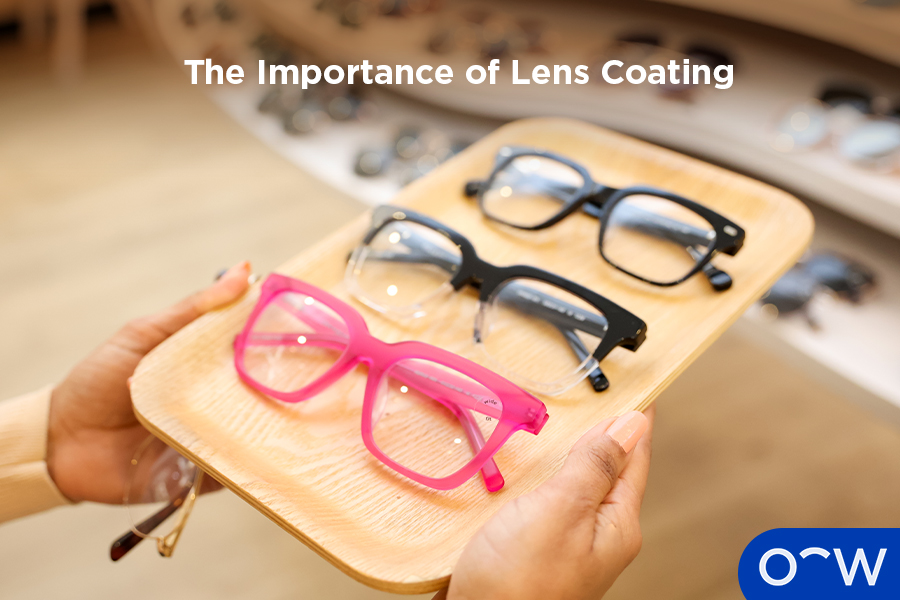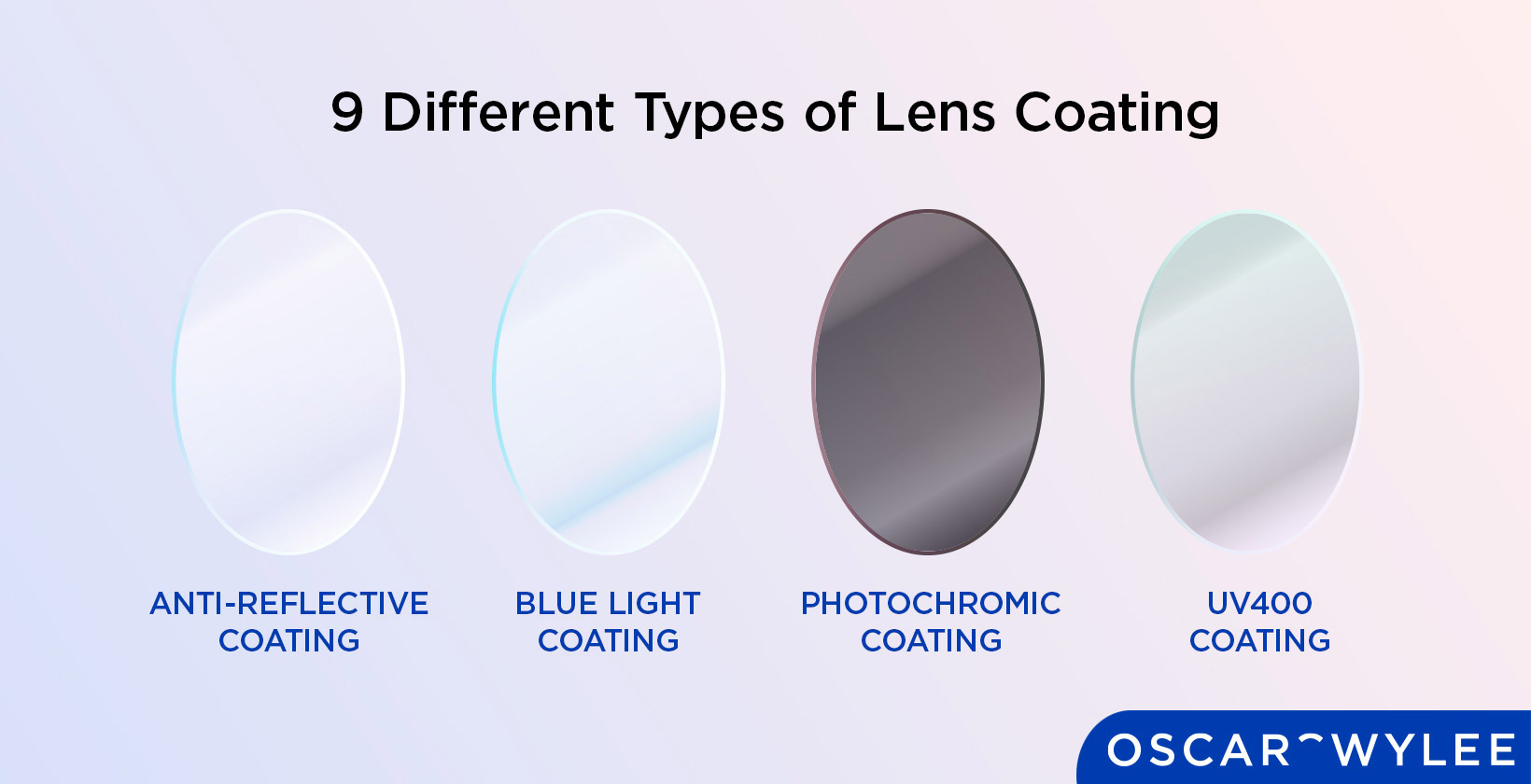9 Different Types of Lens Coating
Published on October 9th, 2024
There are a variety of different lens coatings that a person can add to their glasses or sunglasses lenses to help with their eye care and lifestyle needs. Lens coatings are designed to enhance a person’s eyewear and help them get the most from their frames. The 9 different types of lens coating include anti-reflective coating, blue light coating, UV400 protection coating, scratch-resistant coating, mirror coating, hydrophobic coating, oleophobic coating, photochromic coating and polarised coating. The different types of lens coatings are listed below.
- Anti-reflective coating: Anti-reflective coating refers to a coating that reduces lens reflection.
- Blue light coating: Blue light coating is a lens coating that cuts how much blue light enters the eye.
- UV400 protective coating: UV400 protection coating is designed to protect the eyes from UV rays up to 400 nanometres.
- Scratch-resistant coating: Scratch-resistant coating is applied to lenses to help prevent scratches.
- Mirror coating: Mirror coating is a sunglasses lens that helps to reduce lens reflection.
- Hydrophobic coating: Hydrophobic coating helps lenses to become more water resistant, meaning water is less likely to stick to the lens.
- Oleophobic coating: Oleophobic coating is a coating added to lenses to prevent oil from sticking to the lens.
- Photochromic coating: Photochromic coating is a type of lens coating that darkens from clear to dark when exposed to UV rays.
- Polarised coating: Polarised coating is a type of lens feature that helps minimise glare from the sun by cutting light on the horizontal wavelength. Many manufacturers will use a polarised sheet for this feature, as opposed to a coating.


1. Anti-Reflective Coating
Anti-reflective coating is a type of coating that helps reduce the amount of light that reflects off lenses. Anti-reflective coating is a thin layer applied to the lens that removes reflections that you may usually see from your glasses. Anti-reflective coating will help to get rid of halos or glare around light sources at night time. At Oscar Wylee, basic anti-reflective coating is included with a blue light filter. Premium anti-reflective coating will be an additional cost.
2. Blue Light Coating
Blue light coating is a type of lens coating that helps to reduce the amount of blue light that reaches the eye. Blue light is a type of visible light that can be natural and emitted from the sun, or artificial, emitted from computer and phone screens and LED light bulbs. The exact impact of long-term blue light exposure on eye health is still under investigation, however it has been theorised that blue light may cause digital eye strain, dry eye, disruption to sleep patterns and has the potential to damage retinal cells. According to UC Davis Health, frequent, long term exposure to blue light may cause retinal cell damage that leads to eye conditions such as macular degeneration. Blue light coating aims to reduce the amount of blue light that enters the eye and hits the retina. According to a 2017 study titled ‘Blue-Light Filtering Spectacle Lenses: Optical and Clinical Performances’, blue light lenses may theoretically reduce the phototoxicity of blue light by 10.6 - 23.6% , with phototoxicity referring to irritation caused by UV or blue light. At Oscar Wylee, our blue light filter is built into the lens material, as oppose to a coating.
3. UV400 Protection Coating
UV400 protection coating refers to a lens coating that protects the eyes from UV rays up to 400 nanometres (nm). UV rays are a type of light emitted from the sun. UV light can be harmful to the eyes if they are exposed to it for extended periods of time. Extended exposure to UV can lead to eye issues such as growths on the eye, cataracts and potentially eye cancer such as ocular melanoma. UV400 protection coating helps to prevent damage from UV exposure by providing a barrier between the eyes and UV rays. At Oscar Wylee, all glasses come with UV400 coating for no additional cost.
4. Scratch-Resistant Coating
Scratch-resistant coating refers to a lens coating that helps to prevent scratches on the lens of glasses. Scratch-resistant coating works by making the glasses harder and therefore less prone to scratches than a softer lens. Scratch-resistant coatings do not guarantee that lenses will not be scratched, but may help to prevent. At Oscar Wylee, all glasses come with scratch-resistant coating.
5. Mirror Coating
Mirror coating is a sunglasses lens coating that helps prevent light reflection on lenses. Mirror coating is another type of anti-reflective coating, meaning that its main purpose is to reflect light from a lens, helping to reduce glare and make vision clearer. The difference between anti-reflective and mirror coating is that anti-reflective coatings are typically clear, whereas a mirror coating may look more solid from others' perspectives. Mirror coatings can also be different colours. For information on Oscar Wylee mirror coatings, see our team in store.
6. Hydrophobic Coating
Hydrophobic coating is a type of lens coating that helps to prevent water from sticking to a lens. Hydrophobic coatings make lenses water-resistant, meaning water will not attach to a lens as easily. The hydrophobic coating makes it easier to keep lenses clean and well taken care of. Hydrophobic coating is included with Oscar Wylee anti-reflective lenses for an additional cost.
7. Oleophobic Coating
Oleophobic coating refers to a lens coating, similar to hydrophobic coating, that helps to prevent oils from sticking to a lens. Oleophobic makes lenses more resistant to oils, making it harder to smudge or get fingerprints on a lens. Oscar Wylee does not sell oleophobic coatings.
8. Photochromic Coating
Photochromic coating refers to a type of lens coating that turns from clear to dark when exposed to UV rays from the sun. A photochromic lens is coated with a chemical that reacts with sunlight, darkening a clear coating to dark sunglasses tint. When a person goes back inside or under cover where UV light cannot right the lenses, they will go back to clear. The purpose of the photochromic coating is convenience. Photochromic lenses mean a person does not need to change between prescription glasses and sunglasses, as they exist within the same pair of lenses. At Oscar Wylee, our photochromic lenses are also referred to as adaptive lenses.
9. Polarised Coating
Polarised coating refers to a lens feature that helps to minimise sun glare, also helps to provide UV protection. Polarised lenses are made from specific chemicals that help to stop horizontal light from entering through the lens, thus lessening the effects of glare from the sun. Polarisation can be a coating, but is often a sheet applied to lenses. Polarisation is good for cutting glare from roads, water and snow. At Oscar Wylee, we have polarisation available. See our website or visit our store for more information.
What is Lens Coating?
A lens coating refers to a coating that is applied to the top of a glasses or sunglasses lens. Lens coatings can include a range of different coatings with different purposes, including photochromic coating, blue light coating, UV400 protection coatings and anti-reflective coating.
What is the Importance of Lens Coating?
The importance of lens coating depends on individual eye care needs and the purpose of the coating chosen. Blue light coating, for example, is not an essential coating for eye health but can be important for those looking at screens for a long time, as it can help protect the eyes from blue light. UV400 coating is an important lens coating for all people to have, regardless of eye care needs, as it protects the eyes from UV rays. Prolonged exposure to UV rays can have negative effects on the eye.


Can you have Multiple Lens Coating on Glasses?
Yes, you can have multiple lens coatings on glasses. People can have multiple coatings on glasses to help cater for their eye care needs. For example, a person may have a blue light coating and anti-reflective coating, to help limit blue light entering the eye and limit light reflection on glasses. Not all coatings will work together however, such as photochromic and mirror coatings.
What are the Benefits of Lens Coating in Glasses
There are several common problems that different lens coatings can help to address. Photochromic lens coating helps to address issues of convenience for those who need prescriptions for both glasses and sunglasses. With photochromic lens coatings, people don't need to change between sunglasses and glasses as the lens do this for them. Blue light coating can help to address digital eye strain and fatigue by limiting the amount of blue light entering the eye.
What are the Factors to Consider When Choosing Lens Coating for Glasses?
The benefit of lens coatings in glasses is that they allow a person to customise their glasses to meet their individual eye needs. A person with a prescription for all distances, who doesn't want to switch between glasses and sunglasses, can use photochromic coating so they can have both eyewear in one pair. Some coatings, like UV400 protection and anti-reflective, are beneficial for all regardless of individual eye care needs. UV400 protection helps protects the eye from UV rays and anti-reflective can limit glare and reflection on glasses, helping a person see clearer.
- Individual eye care needs: It is important to consider individual eye care needs when choosing lens coatings. Those with a prescription should consult with an optometrist or knowledgeable retail team member on what lens coatings can help them get the most use from their optical glasses.
- Lifestyle needs: Lifestyle needs is an important thing to consider when choosing glasses lenses as not all coating will be suitable. People who don't have prescriptions or don't spend time in front of the computer may have no need to blue light or photochromic coatings. Those who spend lots of time outside may benefit from polarisation coating.
- Costs: Cost is an important factor to consider when choosing lens coatings as most lens coatings are typically an additional cost on top of the prices of a frame. Be sure to check with your retailer regarding the cost of coatings.
How to Choose Lens Coating for Glasses from Oscar Wylee?
The best way to choose lens coatings for glasses from Oscar Wylee is to come into store to speak with our knowledgeable retail team. Speak with our retail staff who can give you information on the lens coatings we have and their cost. You can also read one of our webpages on lens types. Oscar Wylee has several pages across our website dedicated to informing people about the different types of coatings we provide, including polarisation, UV400 protection and photochromic lenses.
How to Look After Coated Lenses?
The way to look after coating lenses is the same as any other type of lenses or glasses you have. The best way to look after your glasses and their lenses is to keep your glasses clean, making sure there is no dust, dirt or debris build up. It is also recommended that you keep your glasses and their lenses safe by not leaving them on your head where they could fall off, or leaving them face down where they may be scratched. You should also not leave glasses in the car, hanging from clothes, and should always handle them with two hands. These measures will help to protect your glasses and their lenses from scratches, smudges and breakages.



